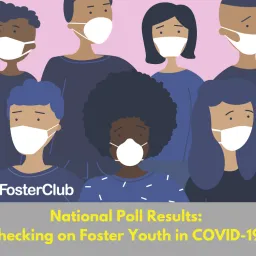SUMMARY
Since the beginning of the pandemic, FosterClub has conducted several polls to monitor how the pandemic is affecting young people in and from foster care. FosterClub conducted a poll in late March (results here) and an additional poll in early May to gain a better sense of how young people in and from foster care are doing. In this most recent poll, conducted November 24 - December 5, we heard from 474 young people with lived experience in foster care who shared how they are faring during this pandemic.
Like our earlier polls, we asked young people about their needs in light of the pandemic, specifically related to access to stimulus aid, employment, education, unemployment benefits, housing, food security, health and connections. Again, similar to earlier findings, this poll continues to reveal how COVID-19 has caused young people with lived foster care experience to lose employment and housing, to face food insecurity, to struggle to get health care needs met, and become increasingly isolated as many do not have significant relationships they can rely on for financial or emotional support. Not surprisingly, young people between the ages of 18 and 24 who were still in foster care reported having more information, greater access to resources, and better housing stability than those no longer in care. This underscores the growing understanding in the field of child welfare about the critical importance of providing federal and state assistance to young adults during this final developmental period in adolescence, particularly during a crisis like COVID-19.
Approximately 63 percent of the 474 poll respondents had been tested for COVD-19, with 13% reported they had tested positive for COVID-19. Of those who had not tested positive, 32 percent reported being extremely worried they would catch the virus, 49 percent reported being somewhat worried and 19 percent reported not being worried they would catch it. Approximately 57 percent of the respondents reported being extremely worried that someone they care about would catch COVID-19.
Check out the key findings below.
You can also download the detailed findings here >>>>
Key Findings
-
Housing Stability: Forty-three percent of respondents were forced to move because of COVID-19; 29 percent reported they have found stable housing now and 14 percent have still not found stable housing. Several young people noted that they were able to return to a previous foster home, although they recognized that was a temporary solution. Many young people in this age group indicated that their housing was tied to their schooling, and worried where they will go if school shuts down again. Foster Care stabilizes housing: Approximately 31 percent of those still in foster care were told they can stay in their current placement compared with 3 percent of those no longer in care.
-
COVID-19 Status and Perceived Risks: Approximately 67 percent of the 474 poll respondents had been tested for COVD-19, with 13% reported they had tested positive for COVID-19 since the pandemic began. Approximately 57 percent of the respondents reported being extremely worried that someone they care about would catch COVID-19.
-
Employment: Approximately 66 percent reported that they were employed before the virus, compared with 45 percent having employment (full or parttime) now. Only half of those who applied for unemployment received it.
-
Education: While education and schooling seems to have stabilized since our last poll, young people reported having difficulty focusing, the challenges with virtual learning, and lack of access to computers or reliable WiFi. Some reported they needed to suspend their education plans in order to make money for necessities.
-
Stimulus Checks: Just over half of the respondents said they received the stimulus check.
-
Food Insecurity: Consistent with our earlier polls, nearly 1 in 5 young people, or 19% of those questioned, reported they have run out of food.
-
Guidance from Adults: Similar to our other polls, nearly one in 5 youth reported that they are entirely on their own, lacking connections that might help them endure this pandemic.

